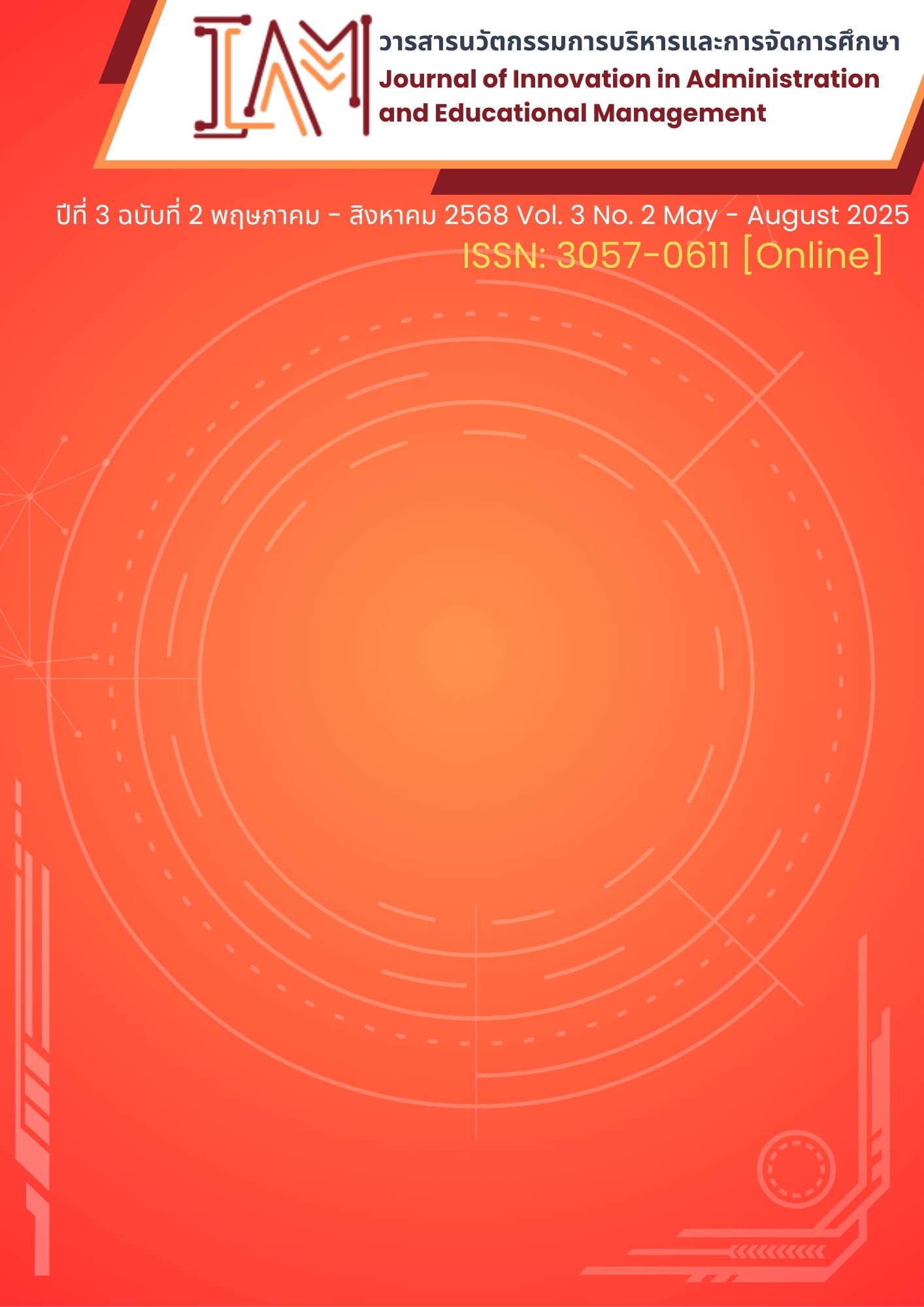แนวทางการป้องกันภาวะหมดไฟในการทำงานของผู้บริหารสถานศึกษาสังกัดสำนักงานเขตพื้นที่การศึกษาประถมศึกษาแพร่ เขต 1
คำสำคัญ:
ภาวะหมดไฟในการทำงาน, ผู้บริหารสถานศึกษ, สำนักงานเขตพื้นที่การศึกษาประถมศึกษาแพร่ เขต 1บทคัดย่อ
บทความวิจัยนี้มีวัตถุประสงค์ 1) เพื่อศึกษาภาวะหมดไฟในการทำงานของผู้บริหารสถานศึกษาและ 2) เพื่อศึกษาแนวทางการป้องกันภาวะหมดไฟในการทำงานของผู้บริหารสถานศึกษาสังกัดสํานักงานเขตพื้นที่การศึกษาประถมศึกษาแพร่ เขต 1 โดยมีการดำเนินการวิจัยแบ่งออกเป็น 2 ขั้นตอน ได้แก่ ขั้นตอนที่ 1 การศึกษาภาวะหมดไฟในการทำงานของผู้บริหารสถานศึกษากลุ่มผู้ให้ข้อมูล ได้แก่ ผู้บริหารสถานศึกษาสังกัดสำนักงานเขตพื้นที่การศึกษาประถมศึกษาแพร่เขต 1 จำนวน 76 คน ได้มาโดยการเลือกแบบเจาะจง เก็บรวบรวมข้อมูลด้วยแบบสอบถามมีลักษณะเป็นมาตรประมาณค่า 5 ระดับ วิเคราะห์ข้อมูลด้วยค่าเฉลี่ยและส่วนเบี่ยงเบนมาตรฐาน ขั้นตอนที่ 2 การศึกษาแนวทางการป้องกันภาวะหมดไฟในการทำงานของผู้บริหารสถานศึกษากลุ่มผู้ให้ข้อมูล ได้แก่ ผู้ทรงคุณวุฒิ จำนวน 4 คน เก็บรวบรวมข้อมูลด้วยแบบสัมภาษณ์ วิเคราะห์ข้อมูลด้วยการวิเคราะห์เนื้อหา ผลการวิจัยพบว่า
- ระดับภาวะหมดไฟในการทำงานของผู้บริหารสถานศึกษา สังกัดสำนักงานเขตพื้นที่การศึกษาประถมศึกษาแพร่ เขต 1 ในภาพรวม อยู่ในระดับน้อย เมื่อพิจารณารายด้านพบว่า ด้านที่มีค่าเฉลี่ยสูงสุด คือ ด้านความอ่อนล้าทางอารมณ์ และด้านที่มีค่าเฉลี่ยต่ำสุด คือ ด้านการลดค่าความเป็นบุคคล
- แนวทางการป้องกันภาวะหมดไฟในการทำงานของผู้บริหารสถานศึกษาสังกัดสํานักงานเขตพื้นที่การศึกษาประถมศึกษาแพร่ เขต 1 พบว่า ผู้บริหารสถานศึกษาควรประชุมร่วมกับผู้ปกครอง ชุมชน และคณะกรรมการสถานศึกษาเพื่อนำเสนอนโยบายและสร้างความเข้าใจ มีการสื่อสารอย่างชัดเจนกับครูผู้สอนในการร่วมกันกำหนดเป้าหมายและการทำงานอย่างเป็นระบบ สำนักงานเขตพื้นที่การศึกษาควรทำหน้าที่ส่งเสริม กำกับ และติดตามการบริหารงานที่มอบหมายอย่างต่อเนื่องพร้อมทั้งสร้างแรงจูงใจเชิงบวกผ่านการสนับสนุนงบประมาณ การยกย่องชื่นชม
Downloads
เอกสารอ้างอิง
กรมสุขภาพจิต. (2562). ภาวะหมดไฟในการทำงาน (burnout syndrome). สืบค้น 1 กันยายน 2567, จาก https://dmh.moph.go.th/news/view.asp?id=2270
จุไรภรณ์ วิจักขณวงศ์. (2567). กลยุทธ์สร้างพลังกาย พลังใจ ป้องกันภาวะหมดไฟในการทำงาน. วารสารวิชาการรัฐศาสตร์และรัฐประศาสนศาสตร์, 6(1), 154 - 167.
ฉัตรชกรณ์ ระบิล และวิลาสินี จินตลิขิตดี. (2564) . ภาวะหมดไฟในการทำงานของบุคลากรในสำนักงานคณะกรรมการการศึกษาขั้นพื้นฐาน. วารสารสวนสุนันทาวิชาการและวิจัย, 15(2), 60 - 79.
ธีระ รุญเจริญ. (2548). สู่ความเป็นผู้บริหารสถานศึกษามืออาชีพ. กรุงเทพฯ: ข้าวฟ่าง.
บุญชม ศรีสะอาด. (2560). การวิจัยเบื้องต้น (พิมพ์ครั้งที่ 10). กรุงเทพฯ: สุวีริยาสาส์น.
ปองกานต์ ศิโรรัตน์. (2563). การศึกษาเกี่ยวกับภาวะหมดไฟในการทำงาน (Job Burnout) ของพนักงานองค์กรรัฐวิสาหกิจ กลุ่มเจเนอเรชั่นเบบี้บูมเมอร์. (สารนิพนธ์หลักสูตรปริญญาการจัดการมหาบัณฑิต). กรุงเทพฯ: มหาวิทยาลัยมหิดล.
พชรอร วรรณภีระ. (2565). ภาวะหมดไฟในการทำงานและความพึงพอใจในการทำงานของเภสัชกรประจำโรงพยาบาล. วารสารเภสัชกรรมไทย, 16(2), 308 - 322.
พรชัย สิทธิศรัณย์กุล. (2562). รู้เท่าทัน Burnout ไม่ใช่โรค. สืบค้น 20 สิงหาคม 2567, จากhttps://kcmh.chulalongkornhospital.go.th/line/รู้เท่าทัน-Burnout-ไม่ใช่โรค/
พิชญ์ พิเศษสิทธิ์. (2563). ฟังคำตอบจากคุณหมอ! คุณกำลังเข้าสู่ภาวะหมดไฟในการทำงานหรือเปล่า. สืบค้น 18 สิงหาคม 2567, จาก https://www.phyathai.com/th/article/3049-ฟังคำตอบจากคุณหมอ__คุณก?srsltid=AfmBOorWC2p1wkji4WwP9YYJTh-V1rzkpsVJJ-DFT_S5OuqAedmhMNtP.
ภาณุมาศ เกษรสุริวงค์ และ คณะ. (2566). ภาวะหมดไฟในการทำงานของผู้บริหารสถานศึกษา. วารสารวิชาการโรงเรียนนายเรือ, 10(1), 15 - 24.
มลฤดี เพ็งสง่า. (2566). การบริหารสถานศึกษายุคดิจิทัล. วารสารวิชาการศึกษาศาสตร์ ศรีนครินทรวิโรฒ, 24(2), 162 - 175.
รัตนา แซ่เล้า. (2565). จากความท้าทาย สู่คุณภาพการศึกษาของประเทศไทย : กฎระเบียบ การบริหารทรัพยากรและความเป็นผู้นำ. กรุงเทพฯ: The Asia Foundation.
รุจิรัตน์ จันทะคุณและนัทนิชา โชติพิทยานนท์. (2566). ภาวะหมดไฟในการทำงานของบุคลากร สำนักงานการปฏิรูปที่ดินเพื่อเกษตรกรรม. วารสารรัฐศาสตร์รอบรู้และสหวิทยาการ, 6 (3), 196 - 211.
ลัญฉน์ศักดิ์ อรรฆยากร. (2566). ภาวะหมดไฟ (Burnout syndromes). สืบค้น 18 สิงหาคม 2567, จาก https://www.medparkhospital.com/lifestyles/burnout-syndrome.
วชิรญาณ์ มณีวรรณ. (2564). ปัจจัยที่ส่งผลต่อภาวะหมดไฟของครูในสถานศึกษาสังกัดสำนักงานเขตพื้นที่การศึกษามัธยมศึกษากรุงเทพมหานคร เขต 2. (ปริญญานิพนธ์การศึกษามหาบัณฑิต). กรุงเทพฯ: มหาวิทยาลัยศรีนครินทรวิโรฒ.
วิยะดา เหลืองด่านสกุล. (2565). ภาวะหมดไฟและข้อเสนอแนะในการป้องกันภาวะหมดไฟในการทำงานของแพทย์ประจำบ้านและแพทย์ประจำบ้านต่อยอด สาขาสูติศาสตร์-นรีเวชวิทยา โรงพยาบาลภูมิพลอดุลยเดช. (วิทยานิพนธ์วิทยาศาสตร์มหาบัณฑิต). พิษณุโลก: มหาวิทยาลัยนเรศวร.
ศุภอร กองแพ็ง. (2565). การศึกษาแนวทางบรรเทาภาวะหมดไฟในการทำงานของนักวิเคราะห์นโยบายและแผน กลุ่มเจเนอเรชั่นวาย (Generation Y) กรณีศึกษา สำนักยุทธศาสตร์และประเมินผล กรุงเทพมหานคร. (สารนิพนธ์หลักสูตรปริญญารัฐประศาสนศาสตรมหาบัณฑิต). กรุงเทพฯ: จุฬาลงกรณ์มหาวิทยาลัย.
สถิรพร เชาวน์ชัย. (2567). การบริหารงานวิชาการในสถานศึกษาเพื่อพัฒนาคุณภาพผู้เรียน. พิษณุโลก: การพิมพ์ ดอทคอม.
สรณ์สิริ กิจติยะพงศ์. (2565). การบริหารงานบุคคลในสถานศึกษา. บัณฑิตศึกษาปริทรรศน์ วิทยาลัยสงฆ์นครสวรรค์, 10(1), 149 - 156.
สำนักงานเขตพื้นที่การศึกษาประถมศึกษาแพร่ เขต 1. (2566). แผนปฏิบัติการประจำปีงบประมาณ พ.ศ. 2567. สืบค้น 18 กันยายน 2567, จาก https://drive.google.com/file/d/
rHOXYux65QPyp2ZjFbLBlS9bweIu4dQV/view
สุรศักดิ์ ปาเฮ. (2566). การบริหารจัดการโดยใช้โรงรียนเป็นฐาน (พิมพ์ครั้งที่ 5). กรุงเทพฯ: โรงพิมพ์คำนำ.
Maslach, C. , & Jackson, S. E. (1981) . The measurement of experienced burnout. Journal of organizational behavior, 2(2), 99 - 113.
ดาวน์โหลด
เผยแพร่แล้ว
รูปแบบการอ้างอิง
ฉบับ
ประเภทบทความ
สัญญาอนุญาต
ลิขสิทธิ์ (c) 2025 วารสารนวัตกรรมการบริหารและการจัดการศึกษา

อนุญาตภายใต้เงื่อนไข Creative Commons Attribution-NonCommercial-NoDerivatives 4.0 International License.






